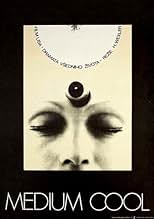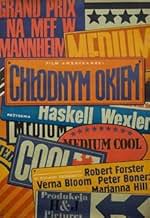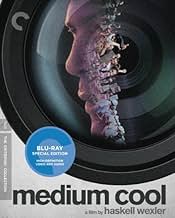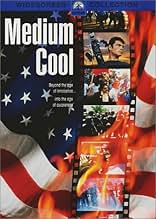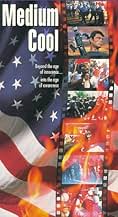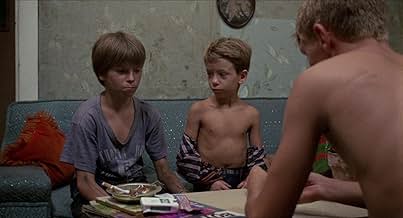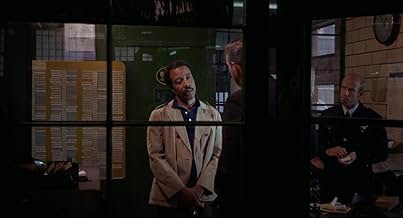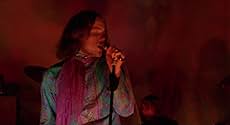Un reportero de televisión se ve personalmente involucrado en la violencia que estalla durante la Convención Nacional Democrática de 1968.Un reportero de televisión se ve personalmente involucrado en la violencia que estalla durante la Convención Nacional Democrática de 1968.Un reportero de televisión se ve personalmente involucrado en la violencia que estalla durante la Convención Nacional Democrática de 1968.
- Dirección
- Guionista
- Elenco
- Premios
- 2 premios ganados y 4 nominaciones en total
- Dirección
- Guionista
- Todo el elenco y el equipo
- Producción, taquilla y más en IMDbPro
Opiniones destacadas
This film is better upon the second viewing, the first time I saw this I thought it was somewhat dated or boring, I couldn't have been more wrong. Initially I watched this film because it was directed by Haskell Wexler whose work I admire, and I'm from Chicago and had heard it shows much of the city and the riots of 68. I enjoyed seeing the city forty years ago to see what was the same and what had changed, much has changed yet much remains the same from what I have seen of the people, places, buildings etc. It was great to see the Kinetic Playground on there, Chicago's electric ballroom, and other area's such as Lincoln Park. On the second viewing, I realized that this is a very important film in that it adroitly captures a moment in time, a moment we can never have again that is lost forever, that one second in our history that pivoted us as a nation between innocence and awareness and possibly that crucial moment which has brought us to the point we are at today. This movie is very important as a document of history, not to mention how well it's shot. The angles, the color, the way he goes in and out of focus make this a true gem that gets better the more you see it. Great soundtrack as well, Zappa, Mike Bloomfield and others.
This is one of the great American movies. The reasons for its obscurity have everything to do with mass consumerism in the late 20th century and nothing to do with its quality. In my opinion this film captures the essence of the late 1960s better than Easy Rider, The Graduate, or any of the other popular films that have come to be associated with that era.
Wexler combines a very European (Italian Neorealist/French New Wave) style with a very American subject matter in a way that comes across as completely natural. It is an art film that plays like watching the evening news.
It is exciting both formally, and culturally: not only does it provide a lasting document of the late 1960s counter-culture in conflict with the aging, square America of the Eisenhower era, it more specifically does a fine job of representing the more general cultural conflict of rural people (here white Appalachians) thrust into the Yankee city environment.
All this, and the movie is fun to watch, not some intellectualized snorefest. It a great movie.
Wexler combines a very European (Italian Neorealist/French New Wave) style with a very American subject matter in a way that comes across as completely natural. It is an art film that plays like watching the evening news.
It is exciting both formally, and culturally: not only does it provide a lasting document of the late 1960s counter-culture in conflict with the aging, square America of the Eisenhower era, it more specifically does a fine job of representing the more general cultural conflict of rural people (here white Appalachians) thrust into the Yankee city environment.
All this, and the movie is fun to watch, not some intellectualized snorefest. It a great movie.
Haskell Wexler, a cinematographer by trade, practically invented the technique invented we know today as "cinema verite" with this striking drama that plays so much like a documentary, you'd never guess it was fiction without being told. It's less a story and more a voyeuristic look into the lives of ordinary people thrust into extraordinary circumstances, in this case reporters who are covering a political convention and other Chicago locals who are just minding their own business when the legendary riots break out at the 1968 Democratic National Convention.
Even more groundbreaking is the approach Wexler takes in framing the film's final scenes. He had ample warning that there would potentially be some unrest at the convention, so he decided to thrust his cast right into the thick of it, sending them to the foyer and front entrance of the Chicago Convention Center and the crew right along to film the events. No one knew exactly what would happen, making this perhaps the most creative and timely piece of "improvised" drama in the history of filmmaking up to this point.
Every documentary filmmaker who chooses to make his/her film about actions and events rather than simply a bunch of talking heads owes a debt to Wexler and his creative team on "Medium Cool".
Even more groundbreaking is the approach Wexler takes in framing the film's final scenes. He had ample warning that there would potentially be some unrest at the convention, so he decided to thrust his cast right into the thick of it, sending them to the foyer and front entrance of the Chicago Convention Center and the crew right along to film the events. No one knew exactly what would happen, making this perhaps the most creative and timely piece of "improvised" drama in the history of filmmaking up to this point.
Every documentary filmmaker who chooses to make his/her film about actions and events rather than simply a bunch of talking heads owes a debt to Wexler and his creative team on "Medium Cool".
Absorbing, thought provoking and, above all, a unique record of an important "place & time", why "Medium Cool" still fails to gain the attention it deserves remains one of life's great mysteries.
First off, it's a pretty good if somewhat disjointed story two "world-wise" middle class news reporters are sent to film the 1968 Democratic Convention in Chicago and become unwittingly involved in its political demonstrations, the inner city problems that have precipitated them, and the lives of a single mother and her young son in this harsh, confusing and seriously under-privileged world. Its acting, in particular from Robert Forster as the lead reporter and the 13 year old Harold Blankenship as the son, is excellent and at times so effective that it's difficult to remember you're watching a rigidly sequenced film rather than a social documentary. And, it's overlaid with some quite stunning cinema-photography from director Haskell Wexler, one of America's very best exponents of the art, backed up by a perfectly pitched late 60's soundtrack.
Good enough so far, but that's just the start. Add-in its extensive live footage from the streets of Chicago as the riots develop, taken by the film's camera crew as they themselves are caught-up in a very "real" political drama, its ominous sequencing of the build up of events from a fun "day in the park" for the hippies/yippies to serious "police state" level violence, its equally chilling images of what was going on inside the Convention Hall while all of this was taking place, and the clever and disturbing scenes of the mother's desperate search for her lost son as Wexler films her within the increasingly anarchic crowds of demonstrators & troops actually on the streets at the time, and you've got something very special.
Part film and part documentary, not all of what you think is "real" in "Medium Cool" is, and the lines between live and acted scenes are sometimes confusingly and frustratingly blurred, as in the famous call from one of the camera crew of "look out Haskell this is real" as a tear gas canister lands in front of them, which was in fact over-dubbed afterwards. But that's the whole point of the film as the final, almost startling scenes reveal. How far is the media in control? Is what you're seeing real, distorted or contrived? Wexler's brilliance is to take this underlying theme and to mould it into a fascinating exploration of inner city life, American society in a period of huge change, and the power/needs of the media in a TV dominated world, while, in parallel, producing a gripping record of what it's like to be in the centre of a demonstration that's spiralling out of control. Juxtaposing the impersonality of reporting with the very personal situations that are involved, it raises a whole series of questions on the way without falling into the trap of most films of the era in trying to ram home too many answers. And, as a result, it remains as relevant today as it did then.
Quite rightly regarded as one of the best "counter culture" films of the late 60's and much richer and more thought provoking than this classification usually implies, it remains one of the most under-rated films out there.
First off, it's a pretty good if somewhat disjointed story two "world-wise" middle class news reporters are sent to film the 1968 Democratic Convention in Chicago and become unwittingly involved in its political demonstrations, the inner city problems that have precipitated them, and the lives of a single mother and her young son in this harsh, confusing and seriously under-privileged world. Its acting, in particular from Robert Forster as the lead reporter and the 13 year old Harold Blankenship as the son, is excellent and at times so effective that it's difficult to remember you're watching a rigidly sequenced film rather than a social documentary. And, it's overlaid with some quite stunning cinema-photography from director Haskell Wexler, one of America's very best exponents of the art, backed up by a perfectly pitched late 60's soundtrack.
Good enough so far, but that's just the start. Add-in its extensive live footage from the streets of Chicago as the riots develop, taken by the film's camera crew as they themselves are caught-up in a very "real" political drama, its ominous sequencing of the build up of events from a fun "day in the park" for the hippies/yippies to serious "police state" level violence, its equally chilling images of what was going on inside the Convention Hall while all of this was taking place, and the clever and disturbing scenes of the mother's desperate search for her lost son as Wexler films her within the increasingly anarchic crowds of demonstrators & troops actually on the streets at the time, and you've got something very special.
Part film and part documentary, not all of what you think is "real" in "Medium Cool" is, and the lines between live and acted scenes are sometimes confusingly and frustratingly blurred, as in the famous call from one of the camera crew of "look out Haskell this is real" as a tear gas canister lands in front of them, which was in fact over-dubbed afterwards. But that's the whole point of the film as the final, almost startling scenes reveal. How far is the media in control? Is what you're seeing real, distorted or contrived? Wexler's brilliance is to take this underlying theme and to mould it into a fascinating exploration of inner city life, American society in a period of huge change, and the power/needs of the media in a TV dominated world, while, in parallel, producing a gripping record of what it's like to be in the centre of a demonstration that's spiralling out of control. Juxtaposing the impersonality of reporting with the very personal situations that are involved, it raises a whole series of questions on the way without falling into the trap of most films of the era in trying to ram home too many answers. And, as a result, it remains as relevant today as it did then.
Quite rightly regarded as one of the best "counter culture" films of the late 60's and much richer and more thought provoking than this classification usually implies, it remains one of the most under-rated films out there.
Movies have a way of capturing the moment better than recreating it. I can only dread what a recreated 1968 in Chicago would look like from a Hollywood perspective. It would probably resemble something out of Forrest Gump. But Medium Cool happened to capture some brutal fight scenes with police in Chicago as well as scenes from the black ghettos. You can't recreate this stuff. This isn't a documentary but cinema verité and combines fiction and non-fictional elements. It's all shot with Chicago of 68 in the background. A landmark and infamous year for the US with the assassinations of RFK and MLK as well as the 1968 Democratic National Convention which was met with severe state repression. The state wasn't negotiating at this time, it was brutally sending men off to war and attacking those at home with the hired goons of the police force.
It's a great movie which manages to combine fiction and non-fiction and shows us what the sixties were really like. It wasn't all love beads and LSD, although there is an amusing psychedelic sequence which takes place in a club.
I think what I liked most was that even people who were non-political were being dragged into the politics of the time. Events were that serious at the time and people had to begin picking sides, the pleasant, white, middle-class interior of the Chicago DNC or outside fighting and raging against the police.
It's a great movie which manages to combine fiction and non-fiction and shows us what the sixties were really like. It wasn't all love beads and LSD, although there is an amusing psychedelic sequence which takes place in a club.
I think what I liked most was that even people who were non-political were being dragged into the politics of the time. Events were that serious at the time and people had to begin picking sides, the pleasant, white, middle-class interior of the Chicago DNC or outside fighting and raging against the police.
¿Sabías que…?
- TriviaThe line "Look out, Haskell, it's real!" was actually dubbed in after the shooting. It was supposedly what Haskell Wexler was thinking to himself and he wanted to include it.
- ErroresWhen Eileen enters the L looks for Harold, she is wearing a white hair band, but when they show her sitting on the L, the hair band is missing.
- Citas
John Cassellis: If I gotta be afraid in order for your argument to work, then you got no argument.
- Créditos curiososStuds Terkel is credited as "Our Man in Chicago".
- Versiones alternativasDue to copyright disputes, all video releases feature some different songs on the soundtrack from the theatrical version.
- ConexionesEdited into The Kid Stays in the Picture (2002)
- Bandas sonorasSweet Georgia Brown
by Ben Bernie, Kenneth Casey and Maceo Pinkard
Performed by Brother Bones
Courtesy of Tempo Records
Played during roller derby scene
Selecciones populares
Inicia sesión para calificar y agrega a la lista de videos para obtener recomendaciones personalizadas
- How long is Medium Cool?Con tecnología de Alexa
Detalles
Taquilla
- Presupuesto
- USD 800,000 (estimado)
- Tiempo de ejecución
- 1h 51min(111 min)
- Mezcla de sonido
- Relación de aspecto
- 1.85 : 1
Contribuir a esta página
Sugiere una edición o agrega el contenido que falta


